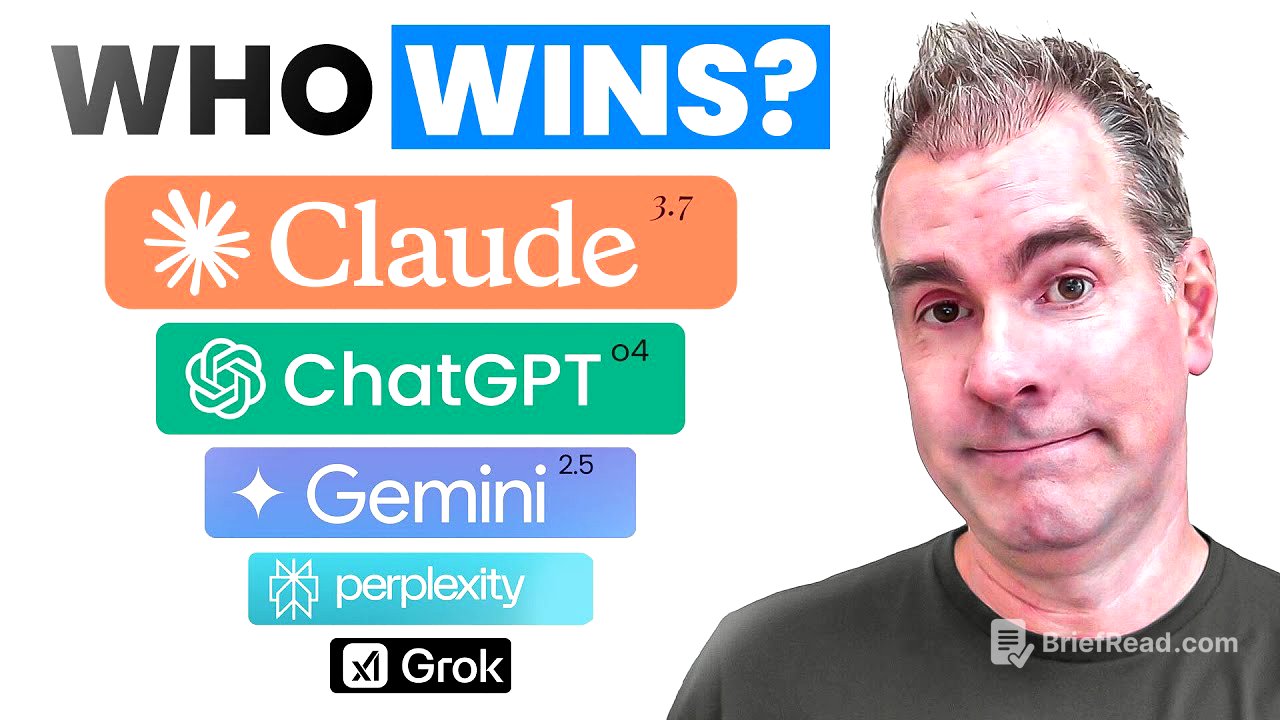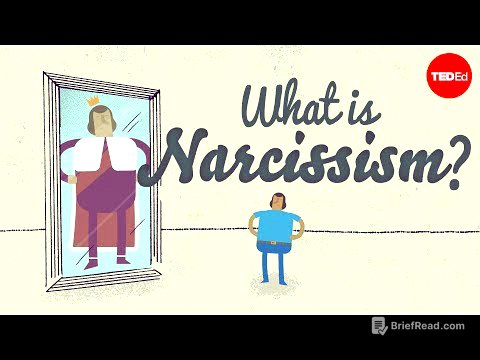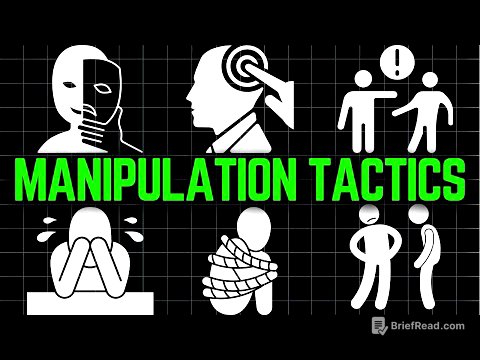Brief Summary
This video provides a comprehensive guide to choosing the right AI tool by comparing five different AI models: ChatGPT, Claude, Google Gemini, Perplexity, and Grok. It discusses the strengths and weaknesses of each, privacy concerns, limitations of the free versions, and whether upgrading to a paid version is worthwhile. The key takeaway is that there is no one-size-fits-all AI tool, and the best choice depends on individual needs and use cases.
- ChatGPT: Versatile for day-to-day tasks, brainstorming, and image generation, but has privacy concerns and limitations on the free version.
- Claude: Excellent for content creation, nuanced conversation, and ethical considerations, with strong privacy features, but limited context window and multimodal capabilities.
- Google Gemini: Great for working with large documents due to its huge context window and multimodal capabilities, but can be inaccurate and lacks personality.
- Perplexity: Ideal for fast searches with citations and real-time information, but lacks depth in research.
- Grok: Best for real-time information and current events with an edgy personality, but relies heavily on X's data and content.
What to expect from the video
The video aims to guide viewers in selecting the most suitable AI tool for their specific needs by evaluating five different AI platforms. For each AI, the video will cover its strengths, weaknesses, privacy considerations, limitations of the free version, and whether upgrading to a paid version is justified. The video is designed for individuals who are either new to AI tools or are looking to optimize their AI usage by understanding which tools are worth paying for.
ChatGPT: What it's good/not good at, privacy concerns, free version limitations, worth the upgrade?
ChatGPT is versatile and suitable for day-to-day AI tasks such as brainstorming, idea development, document analysis, reasoning, and image generation. However, it struggles with large documents due to its smaller context window size (128k tokens, unless using the 4.1 model with a 1 million token context window) and tends to hallucinate, requiring users to verify the accuracy of its outputs. By default, ChatGPT uses all chats and uploaded content to train its models, necessitating users to opt out if they prefer their data not be used for training purposes. The free version of ChatGPT has limitations, including restricted access to more powerful models like 4.0 or 4.0 mini, a limited number of messages every three hours, capped image generation, and restricted deep research capabilities. Upgrading to a paid plan is worthwhile for power users who need access to more powerful reasoning models, a larger context window, extensive image generation, deep research, unencumbered use of advanced voice mode, and the ability to create GPTs.
Claude
Claude is excellent for content creation, nuanced conversation, ethical considerations, and coding. It also integrates well with Google apps like Gmail, Calendar, and Google Drive on the paid version. However, it has a limited context window of 200,000 tokens, which can interrupt longer chats, and fewer multimodal capabilities, with only image support. Claude stands out for its privacy features, as it does not use chats or uploaded content to train its model by default. The free version of Claude has several limitations, including access only to the Claude 4 Sonnet model, daily usage caps, no access to the Opus 4 model, no extended thinking mode, no web search tool, no cloud projects, and no Google Workspace, GitHub, or Dropbox connections. Upgrading to a paid plan is beneficial for those who want to fully utilize Claude's capabilities, especially for coding, content creation, and complex problem-solving, as well as for accessing cloud projects.
Google Gemini
Google Gemini has a huge 1 million token context window, making it suitable for working with large documents and pieces of content. It excels in multimodal capabilities, coding, brainstorming, and problem-solving. However, it is not great for content creation, and its responses can be dry and lacking in personality. Gemini sometimes provides inaccurate information, requiring multiple attempts to obtain correct answers. Privacy is governed by Google's general privacy policy and a specific Gemini apps privacy hub, requiring users to opt out of having their chats, voice recordings, and uploaded content used to train the model. The free version of Google Gemini has limitations, including access only to the Gemini 1.5 Flash model, caps on document and image uploads, and restricted deep research. Upgrading to a paid plan is worthwhile for users who work with large documents and are heavily invested in the Google ecosystem, as Gemini becomes more integrated with Google apps and workflows.
Perplexity
Perplexity is great for fast searches with citations and real-time, up-to-date information. It allows access to several other AI models with a paid plan. However, it lacks depth in research, even with the deep research feature. By default, Perplexity logs usage and queries, requiring users to opt out if they don't want their information used to train the model. The free version of Perplexity limits the number of searches per day (three) and the number of sources it searches. Upgrading to a paid plan is beneficial for those who do a lot of research and rely on accurate, up-to-date information with citations, as it lifts usage caps and allows searching more sources.
Grok
Grok is good at providing real-time information and current events with an edgy personality. However, it is a niche platform that relies heavily on real-time information from X's data and content. It is not great for content creation, deep academic research beyond X content, and has limited integrations. Factual accuracy can be a concern due to the data it pulls from the X platform. Users need to opt out of having their chats used to train the AI model via their X account. Grok has a strong free plan, with about 12 queries per two hours, but is limited in deeper research. Upgrading is worthwhile for those who use X a lot, value its real-time X data integration, and like Grok's distinct personality, ideally as part of the X Premium package.
My personal recommendation if I could only choose one tool
There is no one-size-fits-all AI tool; the best choice depends on specific use cases. If forced to choose one AI tool for day-to-day use, the speaker would pick ChatGPT due to personal preference and frequent usage. However, subscribing to multiple AI tools is valuable for comparing outputs and staying informed about the capabilities of different models.









